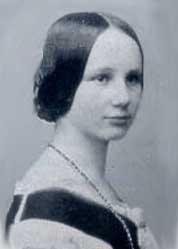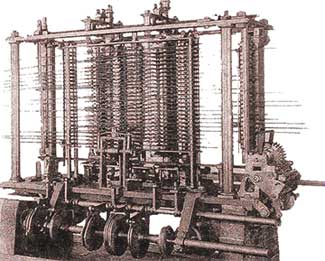 

|
Related
People |
|
|
|
Related
Events |
|
|
|
Related
Technologies |
|
|
|
Other Resources |
|
|  |
 |
Ada Lovelace
|
| Born: |
10 December 1815 |
| Died: |
27 November
1852 |
 |
| Ada
Lovelace. | Ada Lovelace was one
of the first women to become involved in the technology of
computers. Born Augusta Ada Gordon on 10 December 1815 in
London, Ada was the daughter of Lord Byron, the famous poet.
The tempestuous Lord Byron married Annabella Millbanke in
1815, but their marriage was very unhappy, and the two
separated just one month after their child, Augusta Ada, was
born.
Her mother, fearful that young Ada had inherited her
father’s tempestuous character, had her tutored in mathematics
and music in an attempt to counter any tendencies toward
becoming a poet. In fact, Ada inherited both her father’s
intelligence and his psychological imbalance. Ada excelled in
mathematics, but her education was sometimes interrupted by a
mysterious chronic illness, which may have been psychosomatic.
For instance, a severe “attack” at age 14 left her unable to
walk for almost three years.
 |
| Babbage's analytical engine, the machine that was
described in the paper that Lovelace translated.
| Things changed for Ada when,
at age 18, she heard a lecture by Charles Babbage, an English
mathematician who had recently developed the idea for a
mechanical calculator that he called the Difference Engine.
The next year, she was married to William King, the future
Lord Lovelace. Two years later, now using her husband’s new
title, she began to correspond with Babbage as Countess Ada
Lovelace. Then in 1844, she volunteered to translate for
Babbage an article written in Italian about the Difference
Engine. Babbage, impressed with her work, encouraged her to
append her own comments to the translation, which she did. In
this way, Lovelace publicly contributed to the ongoing
development of computing technology. Her notes included
instructions for using the Difference Engine to calculate
so-called Bernoulli numbers, a feat that has earned her the
title of the first computer programmer.
Meanwhile, Ada’s life was not always happy. As her mother
feared, Ada was afflicted by the same psychological problems
that had made her father so difficult. She suffered a mental
breakdown followed by chronic problems with breathing and
eating. She saw a doctor about these problems, but his regimen
of medicines, which included addictive drugs such as heroin
and morphine, caused her to suffer delusions. She beat these
addictions, and the delusions ended, but she then became
obsessed with betting on horse races, and in the 1840s
accumulated a considerable gambling debt. At the height of all
this, she was struck by cancer and died at the early age of 36
on 27 November 1852.
| |
